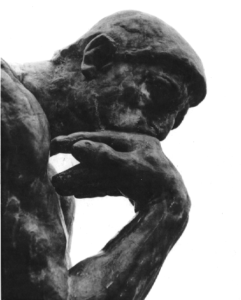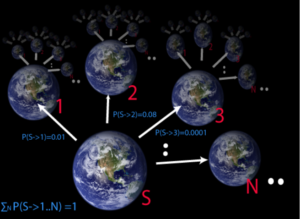 ( Hello Mr. Minton, this is an email that I sent you at Mon,Mar 15, 3:54 PM. It has been roughly three weeks since the sending of that email. I am resending this email in the event that you did not see my first email. If you have seen my first email and were just busy or occupied with your ministry please take your time and respond when you are able. Much thanks for your ministry and service. )
( Hello Mr. Minton, this is an email that I sent you at Mon,Mar 15, 3:54 PM. It has been roughly three weeks since the sending of that email. I am resending this email in the event that you did not see my first email. If you have seen my first email and were just busy or occupied with your ministry please take your time and respond when you are able. Much thanks for your ministry and service. )
Before we can discuss whether God exists or not with atheists, the prior probability of theism is established. It has been argued by atheists that the prior probability of theism is so low that theistic arguments must be incredibly powerful as to overcome this prior probability. Five lines of argument are commonly used.
1. God is more complex than the things he is creating. This objection is à la Richard Dawkins. In his book the God Delusion Dr. Richard Dawkins states that God is more complex than the things he is creating. Thus, appealing to God to explain anything is illegitimate because it only pushes back the problem one step.
2. God’s traits necessitate a great amount of complexity. For example, God’s omnipotence is his ability to do anything logically possible. However, whenever we observe any object performing an action, a complex series of causes and effects occur. For example, when combustion occurs several complex processes occur each with their own cause and effect that generate what we perceive as fire. This same thinking is then applied to all of God’s traits, rendering God incredibly complex and thus a bad explanation of anything at all.
3. Theism is incredibly immodest. This objection is basically that theism rules out more possibilities than other theories. Theism not only eliminates naturalism but all possible forms of polytheism ect, ect. All else being equal, being compatible with fewer possibilities makes a theory less intrinsically probable. For instance, all else being equal, it’s more likely that I draw a heart than that I draw a jack from a standard deck of cards, since there are more hearts, and therefore more ways the heart hypothesis can be true.
4.The famed flying spaghetti monster. The parody argument explains things just as well as theism. But if we are not justified in believeing the stupid alternative then we are not justified in believing theism since both explain the world equally well.
5. Theism adds a superfluous element. Theists believe everything the naturalists do (e.g the natural world) but plus another thing (God) . Thus because simpler hypotheses should be preferred, theism has a lower prior probability.
I’ve heard various responses to these lines of argument but not many of them were detailed or particularly persuasive. So, my question is, what are the theistic rebuttals to these arguments? What are some potential counter-rebuttals and our responses to those rebuttals?
- Andro
 My apologies, Andro, for taking so long to get to this. Cerebral Faith is becoming ever the more demanding of me the more I expand. Nevermind non-ministry related things I both have to do and desire to do. But as the old saying goes, “Better late than never”, right?
My apologies, Andro, for taking so long to get to this. Cerebral Faith is becoming ever the more demanding of me the more I expand. Nevermind non-ministry related things I both have to do and desire to do. But as the old saying goes, “Better late than never”, right?
First off, this objection is similar to the objection to the resurrection of Jesus that I tackled in part 9 of my YouTube series “The Case For The Resurrection Of Jesus”. As with the resurrection of Jesus, I don’t really care whether or not theism is a priori probable. It may be, it may not be. What really matters is whether theism is a posteriori probable. In other words, is theism more probable than atheism after one examines all of the evidence? And I would say the answer to that question is a big hardy yes. The continent nature of the universe, the origin of the universe, the cosmic fine-tuning of the universe, the existence of objective moral values and duties, and the existence of objective beauty all make theism more probable than atheism.
Interested readers who want to check out these theistic arguments I just alluded to have a wide array of free resources here at Cerebral Faith that they can check out after reading this article. I have videos on The Kalam Cosmological Argument The Fine-Tuning Argument, The Local Fine-Tuning Argument, and The Moral Argument.
I also have written many blog articles on The Kalam Cosmological Argument, The Fine-Tuning Argument, The Local Fine-Tuning Argument, and The Moral Argument.
And of course, I’ve devoted entire podcast episodes to these over on The Cerebral Faith Podcast. You can listen to this podcast on just about every platform I can think of (except Audible).
Moreover, there’s an argument for the existence of God that I’ve been intentionally omitting until this paragraph, and that is The Ontological Argument. One of several things I love about this argument (besides me only having to defend a single premise and it getting us all the “Omni” attributes of God) is that its soundness does not depend on probability. It’s a modal argument. Modal logic deals with what is logically necessary and what is logically possible. The Modal Ontological Argument (initially defended by philosopher Alvin Plantinga) asserts that if it’s even possible that A Maximally Great Being (i.e an omnipotent, omniscient, omnipresent, omnibenevolent, morally perfect, necessarily existing being) exists, then it follows logically that a Maximally Great Being actually exists! This may appear like a non-sequitor at first glance, but I strongly recommend you and others to look into this argument and you’ll see that it’s not the logical leap that it first appears to be. If the argument is sound, then God exists. Probability is irrelevant to this argument. All that matters is logically possibility. If God is possible, God exists in some possible world. If God exists in some possible world, then He exists in every possible world, and that means He exists in the actual world.
I have a few videos on this argument as well as blog posts. Click here for the videos and here for the blog articles. And again, I’ve talked about this on the podcast. If The Ontological Argument goes through (and I think it does), then probability of either the a priori or a posteriori kind becomes irrelevant.
But is theism a priori improbable? If it is, atheists need to give better arguments than the ones you’ve listed. I’ll address each of these in order. You said, Andro, that the answers you’ve looked at weren’t at all persuasive, but you didn’t point me to which answers you’ve read, so I don’t know what flaws you found in them and whether or not I’ll just repeat what you’ve already heard. But that’s what the comment section and follow up e-mails are for, I guess.
1: God Is More Complex Than The Things He Is Creating.
It is my opinion that Christian Philosopher Dr. William Lane Craig put this bed to rest a long time ago in his books On Guard and Reasonable Faith. I’m going to quote his response from the former.
“Dawkins thinks that in the case of a divine Designer of the universe, the Designer is just as complex as the thing to be explained, so that no explanatory advance is made. This objection raises all sorts of questions about the role played by simplicity in assessing competing explanations. For example, there are many other factors besides simplicity that scientists weigh in determining which explanation is the best, such as explanatory power, explanatory scope, and so forth. An explanation that has broader explanatory scope may be less simple than a rival explanation but still be preferred because it explains more things. Simplicity is not the only, or even most important, criterion for assessing theories.
But leave those questions aside. Dawkins’ fundamental mistake lies in his assumption that a divine Designer is just as complex as the universe. That is plainly false. As a pure mind without a body, God is a remarkably simple entity. A mind (or soul) is not a physical object composed of parts. In contrast to the contingent and variegated universe with all its inexplicable constants and quantities, a divine mind is startlingly simple. Certainly such a mind may have complex ideas—it may be thinking, for example, of the infinitesimal calculus—but the mind itself is a remarkably simple, spiritual entity. Dawkins has evidently confused a mind’s ideas, which may, indeed, be complex, with a mind itself, which is an incredibly simple entity. Therefore, postulating a divine mind behind the universe most definitely does represent an advance in simplicity, for whatever that’s worth.”1
Dawkins’ critique and Craig’s response to it, is in the context of discussion of The Fine-Tuning Argument mentioned above. I think Dr. Craig’s answer is satisfying. In addition to this, Craig also said, in the same context, that in order for an explanation to be the best, you don’t need to have an explanation of the explanation. So requiring would result in an infinite regress of explanations so that nothing could ever be explained! Science would be destroyed! Because before anything could be explained, you’d have to have an explanation for the explanation, and then you’d have to have an explanation of the explanation of the explanation. Then you’d need to have an explanation of the explanation of the explanation. Then you’d need to have an explanation of the explanation of the explanation of the explanation, ad infinitum. So with regards to “Who designed the designer”, you can either respond “I don’t know” or “the designer is an undesigned designer. He is beginningless and ergo no assembly required.” In fact, as I’ve argued in the context of the Kalam, the latter is more logical because you can’t have a series of Gods begetting Gods through an infinite chain. No creator could ever come into being that way, and ergo, there’d be no universe, and there’d be no God.
2: God’s Traits Necessitate A Great Amount Of Complexity.
In light of what Dr. Craig said in the above quote and what I said, this is a false premise to begin with. However, even if we granted it, the conclusion that “God is…a bad explanation of anything at all” doesn’t follow.
Most people who will read this blog post aren’t brain surgeons or neuroscientists. And maybe they haven’t even read any pop level books on neuroscience in their spare time. The brain is a remarkably complex entity. It has been labeled the most complicated piece of machinery on the planet by some. Even top notch neuroscientists don’t know everything there is to know about this pink thing between my ears. Additionally, I’m sure a lot of people reading this won’t be trained in computer science. They haven’t the slighest clue what makes a MacBook Pro work, or how it connects to the internet. If they were to take it apart, they’d see a bunch of machinery that they can’t make heads or tails of.
So, you could say that the cause of this blog post is an extremely complex thing. But does that mean that the explanation “Evan Minton typed this up on a MacBook pro and used his Wi-Fi to publish it to the internet” is a bad explanation? Does the complexity create an insurmountable barrier to you being justified in affirming “Evan Minton typed this up on a MacBook pro and used his Wi-Fi to publish it to the internet”? No. Of course not. It would ridiculous to even suggest such a thing.
So if the complexity of my mind doesn’t render you unwarranted in concluding that I produced this blog post, why should the complexity of God’s mind prohibit you from concluding that He brought the universe into existence and finely tuned its constants and quantities? The logic behind this objection reduces to absurdity when you apply it consistently. In fact, you wouldn’t be able to believe any intellgent being ever produced any effect! You couldn’t conclude a chef made your birthday cake because “the brain is an incredibly complex organic machine and thus is a bad explanation for anything at all.” Hey, forget intelligent design at the human level. I couldn’t even infer that the poop left in my cat’s litter box was left by my cat? After all, I have no idea how cat brains work! I suspect that they’re pretty complex too, even if not as complex as a human’s.
The complexity of a cause doesn’t mean you’re unwarranted in inferring it. That’s just ridiculous.
3: Theism is incredibly immodest.
You wrote \\“This objection is basically that theism rules out more possibilities than other theories. Theism not only eliminates naturalism but all possible forms of polytheism ect, ect. All else being equal, being compatible with fewer possibilities makes a theory less intrinsically probable. For instance, all else being equal, it’s more likely that I draw a heart than that I draw a jack from a standard deck of cards, since there are more hearts, and therefore more ways the heart hypothesis can be true.”\\
I’m beginning to suspect that the atheists you’ve been reading or interacting with don’t know how analyzing hypotheses works. If this logic were applied elsewhere, what possible theory could get off the ground? Process Structuralism rules out young earth creationism, old earth creationism, Intelligent Design, and a (purely) Neo-Darwinian view of evolution. Does that make it impossible to affirm?
The standard Big Bang model is incompatible with the oscillating universe model and the steady state model, but that didn’t stop the scientific community from abandoning the latter hypotheses in favor of the former.
If Frank murders Bob and the detectives and jury conclude that Bob was killed by a gun shot wound given at point blank range, that eliminates virtually every other cause of death! None of the “Thousand ways to die” were the reason Bob left this world! Now, is the hypothesis “The cause of death was a point blank gun shot wound” an “immodest” option, and therefore it’s “less intrinsically probable?” No. Of course not.
In all of these cases, we are warranted in coming to the conclusions that we do on the basis of the evidence. If the evidence counts in favor of Christian theism, then yeah, that rules out naturalism and every non-Christian religion. So what?
And one more thing; if the sword cuts at all (and it doesn’t), it cuts both ways. Naturalism rules out every single supernaturalist worldview there is! Not just Christian theism, but Deism, polytheism, it rules out all forms of anthropological dualism. If the naturalist is correct, then his own worldview is just as “immodest” and “intrinsically improbable” as theism! In that case, both theism and naturalism are equally likely, and deciding to believe one or the other boils down to the evidence.
4: The Famed Flying Spaghetti Monster.
It most certainly does not “explains things just as well as theism”. It can’t account of the ex nihilo origin of the universe at the big bang, for example. I won’t go into this in detail here, since I already have elsewhere. I explain in my videos and blog articles on The Kalam Cosmological Argument, that the cause of the universe must be spaceless and immaterial, since it is the cause of all space. A “Flying Spaghetti Monster” is a material and spacial entity. It’s made of spaghetti. It occupies space and time and ergo cannot be the cause of space and time. Of course, you could strip the spaghetti monster of its attribute of physicalness and say “Well, it’s an immaterial Flying Spaghetti Monster”. The problem with this is that is seems to me that an essential attribute of spaghetti is to be a pasta blend in tomato sauce. Essential to pasta and tomato sause are other essential properties. There are accidental properties to any spaghetti dish (e.g whether it has or doesn’t have mushrooms or Parmesan cheese), but the essential properties of spaghetti (being a pasta dish with tomato sauce) are physical. You can strip X of all of its accidental properties and it would still be X. For example, you could remove all the mushrooms from a spaghetti dish and it would not cease to be spaghetti. However, you cannot remove the essential properties of X and X still be X. If you strip X of all of its essential properties, it’s no longer X.
The Spaghetti Monster is not the best explanation for objective morality or beauty in the world either, but for the sake of making this blog post longer than it has to be, I’ll leave it to you and my other readers to look into why.
5: Theism adds a superfluous element. Theists believe everything the naturalists do (e.g the natural world) but plus another thing (God) . Thus because simpler hypotheses should be preferred, theism has a lower prior probability.
And again, I would say “who cares about a prior probability? What about the a posteriori probability?” And I would also repeat that simpler explanations aren’t to be preferred if they can’t explain all the data. I think explanatory power and scope are the most important thing a theory needs, and theism definitely has more explanatory power and scope than naturalism.
Theism can explain the origin of the universe, the fine-tuning of the universe, the local fine-tuning of the galaxy, solar system, and Earth-Moon planetary system, the existence of objective morality, the very existence of the contingent universe, and it can explain the resurrection of Jesus of Nazareth, which is the only explanation that can explain all 5 of the minimal facts. Naturalism struggles mightily to account for all of these.
Conclusion
I hope after reading this article that you find these arguments as non-forceful as I do, Andro. They’re really quite bad. I’m sorry it took me so long to get to this.
NOTES
1: Craig, William Lane. On Guard: Defending Your Faith with Reason and Precision (pp. 122-123). David C. Cook. Kindle Edition.

If you have any questions about Christian theology or apologetics, send Mr. Minton an E-mail at CerebralFaith@Gmail.com. It doesn’t matter whether you’re a Christian or Non-Christian, whether your question is about doubts you’re having or about something you read in The Bible that confused you. Send your question in, whatever it may be, and Mr. Minton will respond in a blog post just like this one.
Share this:
- Click to share on Facebook (Opens in new window) Facebook
- Click to share on X (Opens in new window) X
- Click to print (Opens in new window) Print
- Click to email a link to a friend (Opens in new window) Email
- Click to share on Pinterest (Opens in new window) Pinterest
- Click to share on Reddit (Opens in new window) Reddit
- Click to share on LinkedIn (Opens in new window) LinkedIn
- Click to share on Tumblr (Opens in new window) Tumblr
Discover more from Cerebral Faith
Subscribe to get the latest posts sent to your email.





Greetings Mr. Minton, it is no problem at all that you took some time in responding. It is only natural that when balancing both a personal life and an ever-growing ministry that somethings need to be put on the back burner. From now on, please do not feel stressed to answer my questions, waiting is fine by me. God willing, I will continue asking questions as long as you continue answering them. However, I may continue to resend emails at three weeks time as a precaution if that is fine with you.
To get to the main point of the article, I got these objections from Capturing Christianity’s website. More specifically, their mini book/pdf titled “The rationality of Christian theism”, which I found in my hunt for more free books and resources. They provided several of these objections and answers to them. I did not find their answers persuasive so I emailed you. You have answered these objections quite well. I especially appreciated the quote from William Lane Craig, I have to find my copy of On Guard so I can review the quote and it’s context. Again thank you very much for your excellent responses, and may the peace of Christ be with you and your ministry.